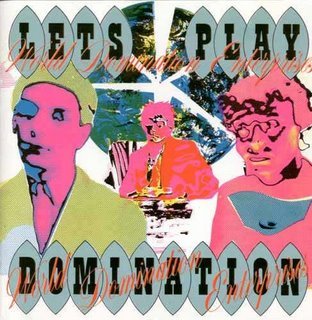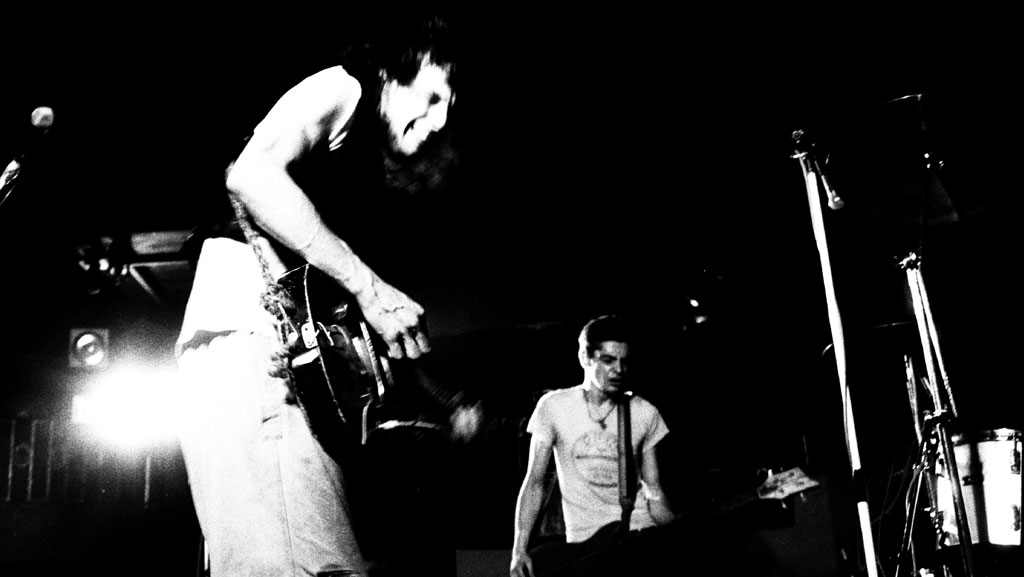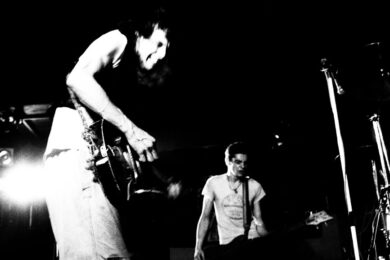It was a noise like no other, wrapped around a skeletal framework of punk, dub, rockabilly, reggae, hip hop and pop. Even now, some twenty years later, nothing comes close to the sheer physical, brutal force in every sinew, cartilage and muscle right at the very heart of Let’s Play Domination, the 1988 debut album from World Domination Enterprises. Of the many and varied noise records that I have bought or had brought to my attention before and since — Sonic Youth, My Bloody Valentine, Health, Keiji Haino, Lighning Bolt — few provoke such extreme reactions from friends: it’s either total, desperate terror or saucer-eyed shock and awe. Nothing shreds my speakers so regularly at such volume; its overpowering, monstrous immensity is a source of relief, a panacea for frustration, a primitive, deafening howl. When people ask what World Domination Enterprises sound like, the simplest answer is that they tear the flesh from my bones in the most deliriously pleasurable fashion imaginable. Their music is like Gunther Von Hagens’ Body Worlds, an emblem of our lives reduced to its most basic, feral form, fascinating and ghastly at once.
Chances are, of course, you’ve never heard of World Domination Enterprises, but for one brief moment they looked as though their name might be a self-fulfilling prophecy. A series of outstanding singles was followed by one solitary album (if one puts aside 1989’s odds and sods collection Love From Lead City) but no amount of championing by the likes of our friend in NYC, Simon Reynolds or a legendary segment on Snub TV could convince the general public that they were ready for the apocalyptic sounds of this grubby, squat-loving three-piece who looked like they may have emerged from beyond the thunderdome.
And so, despite a cover feature from Melody Maker and the patronage of David Bowie (who invited them to support him in Cardiff), the band were soon torn apart by almost apocryphal means: record company problems, extreme stress and — strange but true — the calling of the Jehovah’s Witnesses.
The man behind World Domination Enterprises, and indeed the long overdue reissue of Let’s Play Domination, is Keith Dobson. His childhood, spent traipsing after a military father between bases in Devon, Dorset and Germany’s British Army Of The Rhine, was comparatively peaceful, but music caught him early.
“My mind was totally blown as a young child when I heard ‘All Or Nothing’ by The Small Faces,” he recalls. “At primary school I started a band with my sister and my friend Nigel called The Tigers. We played in the shed, the front room and the garden. My folks moved us to Germany again literally to get us away from this corrupting ‘pop music’ thing which was threatening to destroy God, the Queen and decent values everywhere. ‘The Animals and the dirtier groups have nits!’, me and my sister were duly warned by a genuinely concerned Mum and Dad.”
But their efforts were in vain. Dobson fled home at sixteen to join a band in London, though “within a few months a zealous cop nabbed me with a bit of pot and my Dad threatened to come up with an axe and smash up my drum kit. Course he never did. He’d bought me the kit for my fifteenth birthday, which was very liberal really.”
By the time he formed World Domination Enterprises in early 1985 Dobson was already something of a musical veteran, having drummed under the name Kif Kif Le Batteur with hippie/punk free festival regulars Planet Gong and Here & Now in the 1970s.
“Basically, I’d decided music was gonna be my thing, probably from the moment of that Small Faces experience,” he continues. “I got sacked from my first two bands, mainly for being really young and a bit crap, so I decided to start my own band. I was into writing songs, but also absolutely fascinated with what happened in those ‘golden moments’ that sometimes came along in improvisations. Here & Now developed from experimenting with jamming.”
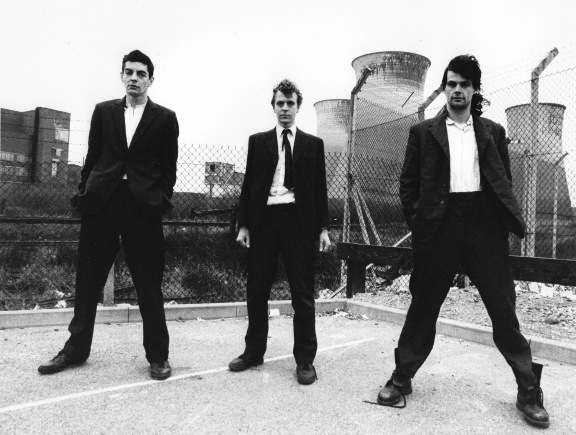
In 1979 Dobson formed The 012, a World Domination Enterprises prototype who took the improvisational aesthetics of his former acts and merged them with the punk sensibilities that he admired. The leap was perhaps not so great as it seems.
“There is no real difference between hippy and punk,” he argues. “They were both essentially about youth wising up to the charade of society being played out around them and reacting to it. There is also a lot of the essence of improvisation in World Dom and The 012. That ‘immediacy of the moment’ was something I worked with very consciously, and in a way it was a continuation of what had started in Here & Now. I wanted to take this ‘moment’ thing up to another level. I read Stanislavsky.”
The 012 were never geared for commercial success: their shows were so chaotic that promoters literally pulled the plug on them if they hadn’t already been banned, so they instead rushed stages between acts if they wanted to play. But now firmly ensconced amidst the anti-establishment, Dobson simultaneously started a cassette label — the provocatively named Fuck Off Records — to release ‘albums’ by, amongst others, Danny And The Dressmakers (who featured one Graham Massey, later of 808 State). Ever restless, he then set up Street Level Studios in 1980, a home from home for many of the DIY bands extant in London at the time, with (former Hear & Now soundman and soon to be Fall associate) Grant Showbiz and 012 drummer Jose Gross. But after two cassette albums, one vinyl album and a line-up change — Steve Jameson now fulfilling the need for “gutter-funk bass”, as Dobson’s Melody Maker ad put it, and drummer Digger Metters not far behind — The 012 became World Domination Enterprises.
They set about recording what would become their finest moment, exploiting Thatcher’s Enterprise Allowance Scheme in order to pay for the six months and the weed required to put a reworked version of the old 012 track ‘Asbestos Lead Asbestos’ down on tape.
Dobson has no qualms about having used government money to fund the band’s beginnings.
“Let’s get something straight here,” he states passionately. “We are born into subjugation. Where is our land? Our birthright? It was taken from us before we even drew our first breath. What we have instead is forced enrolment into some intimidating scheme. And for some strange reason these somebodies who control it are stupidly rich, while us ordinary folk have to scratch and scrape just to get by. It is our right as ordinary humans, maybe even our duty, to get back as much as we can.”
Such arguments are indicative of the rhetoric that surrounded World Domination Enterprises at the time. Growing media interest focussed not only on the visceral, atonal racket that they created but also on their conscious rejection of contemporary Thatcherite values. They were pictured by photographer Tom Sheehan in front of their Chesterton Road short-life housing, reviewed by Simon Reynolds in conjunction with legendary party organisers and industrial waste sculptors Mutoid Waste Company, and much was made of their name. But Dobson denies that they were a political band.
“I’ve never been interested in capital P politics,” he clarifies. “What is true is that I’m a thinker. I spend hours a day just thinking. Anti-establishment? Hell, yes! That’s the natural result from time spent thinking. Our anti-establishment stance was . . . a huge part of what World Dom was about. If you’re gonna have words, why on earth should they not mean something important?
And so in 1987, now signed to Mute Records imprint Product Inc. and with two more singles — ‘Hotsy Girl’ and ‘Catalogue Clothes’ — behind them, they retired to Cold Storage Studios (the same space as they’d recorded ‘Asbestos Lead Asbestos’) with Cure producer David M Allen and engineer Victor Van Vugt. To their disappointment, “they’d upgraded from 16-track to 24-track and it sounded like a hospital.” One week out of the allocated three was spent trying to re-record and failing to match the original ‘Asbestos Lead Asbestos’, but despite this the album that emerged, after a further three weeks of mixing, was quite simply devastating.
Let’s Play Domination is the record that Steve Albini has sought to make all his life. It opens with a depth charge explosion before Jameson’s gutter-funk bass rolls in, Metters’ drums explode like shattering bones, and Dobson’s guitar then forever redefines concepts of ‘industrial’ music. The song was called ‘Message For You People’, and it did exactly what it said on the tin. As Simon Reynolds’ Melody Maker review starkly stated, “why settle for the prim join-the-dots of a tune when your mind can reel and founder in the myriad tonalities of Keith Dobson’s guitar, all the notes in the universe?” This was, in fact, more than noise: it was somehow rooted in a distant melody and solid structure that made it unusually easy to grasp hold of, but at the same time these cacophonous squalls were the sound of metal chainsawed. It was even rumoured that Dobson’s guitar had been rescued from a skip and strung with cheese wire. The truth was more prosaic.
“It cost me £5 from a guy in another squat, which was cheap even then,” he admits, “and I replaced the missing bridge with a door handle. The tuning took years to emerge during The 012. I just used to tune it as discordantly as possible and whack up the treble to ridiculous proportions, which killed amps fast! Eventually the tuning settled into something regular. More recently I listened to it again and it seems to resemble the tone of my voice, which quite possibly I was subconsciously guiding it towards.”
The album was launched with a respectful trashing of LL Cool J’s ‘I Can’t Live Without My Radio’, bass strings — when they weren’t growling craterous dub — scratched instead of vinyl, Metters’ drumming precision-tooled, Dobson’s invective delivered with venom. It was no wonder that Public Image Ltd allegedly had them thrown off the bill at their Kilburn National performance a few months earlier: they made PiL seem tame in comparison. (Dobson also recalls a Husker Dü support where “our sound was quite literally sabotaged at the mixing desk.”) But the track only hinted at the barbarity contained within the rest of the album. On ‘Trouble Enough’ Dobson spits relentless spleen and bile, ‘Jah Jah Call You’ takes the band’s love of dub and spins wiry guitar lines over thunderous bass and drums, and on ‘Ragamuffin Man’ Dobson sounds like he’s in the process of being strangled. And then there’s ‘Funkytown’, a terrifying reinvention of Lipps Inc’s pop hit that sees it dragged kicking and screaming into a Ladbroke Grove basement and given the beating of its life while its cheesy keyboard line is replaced by what sound like out-of-tune steel drums. But the track betrays the sense of comedy and love of pop behind the band’s fury, something that was often lost amid the philosophising about their sound.
“I’m glad you spotted the humour!” Dobson chuckles. “There would often be just one person at our gigs who’d be laughing the whole way through. We were doing it for him! I only ever do exactly what I like, and I loved those songs. It was crazy for an underground hardcore band to do pop, and I love crazy. And pop. [But] theorising is cool too. They aren’t necessarily exclusive concepts.”
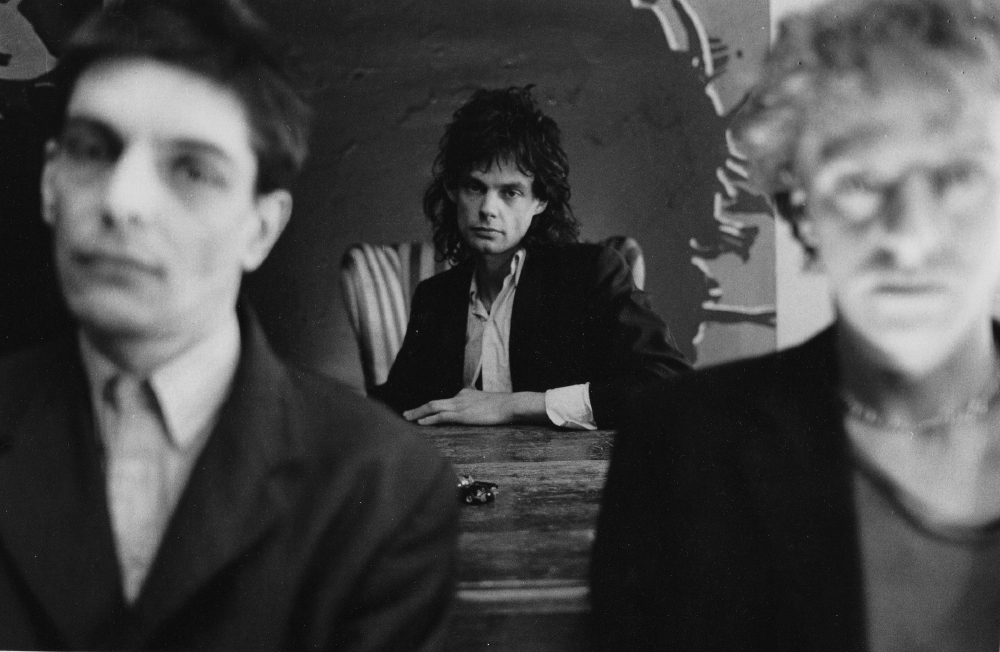
But, as is the way with things, external factors took their toll on the band. A rush-released compilation of live tracks and remixes and a blistering one-off single, ‘Company News’, helped maintain momentum until 1989, when they even toured the Soviet Union; but Product Inc. ran out of money and, at the start of 1990, Digger Metters left the band to join the Jehovah’s Witnesses. Dobson describes himself as having been “absolutely gutted”, and in May 1990, despite having replaced the drummer, he decided he’d had enough. Though the band never officially broke up, Dobson knew he had to step back, something he now attributes to “stress overload”. Happily, he adds that he is now “recovering well from long term chronic fatigue syndrome, which was linked to the stress levels of World Dom and had slowed me down big-time”.
Almost twenty years later the album is again ready to reach out to a fresh audience in a newly mastered shape with bonus tracks, including a previously unreleased demo, ‘Do Do Go Go’, that hints at an increasingly percussive, dancey direction. “It’s an unfinished track and a bit boring as such,” Dobson says modestly, “but we loved the go go thing. We loved dancey. We were trying out another new direction. Each single did that and we loved that. The Lord Jimmy only knows where it would have gone. . . .”
Burned by the business, Dobson’s taking care of the re-release himself (Free Love Records). “Everyone I’ve ever worked with in the record industry has ripped me off, or tried to, with the possible exception of Mute Records”, he explains. “So several years ago I decided to do everything myself and use the internet to publicise and sell stuff. I’d rather sell 1,000 copies and get all the bread than sell 10,000 and never see a cent. Musicians need this income to sustain further activity. Free Love Records is committed to "Fair Trade Music" which means fair for the fans too! They’ve been ripped by the mainstream music companies too.”
Dobson’s plans for World Domination may have fallen short of their goals, but his cottage industry — which also makes available other music with which he’s been involved — and ongoing musical endeavours (including Ici Maintenants, the reunited 1976 line up of Here & Now) are proof that, though he returned to his roots in the West Country some ten years ago, he’s lost none of his edge. More to the point, Let’s Play Domination still sounds as relevant and shocking now as it did then, perhaps even more so. And although Dobson believes Metters remains caught up with the Jehovah’s Witnesses, he admits the possibility of World Domination Enterprises playing again in some shape or form isn’t entirely off the agenda.
And this notion is music to our ears.
Let’s Play Domination is available now from Free Love Records
